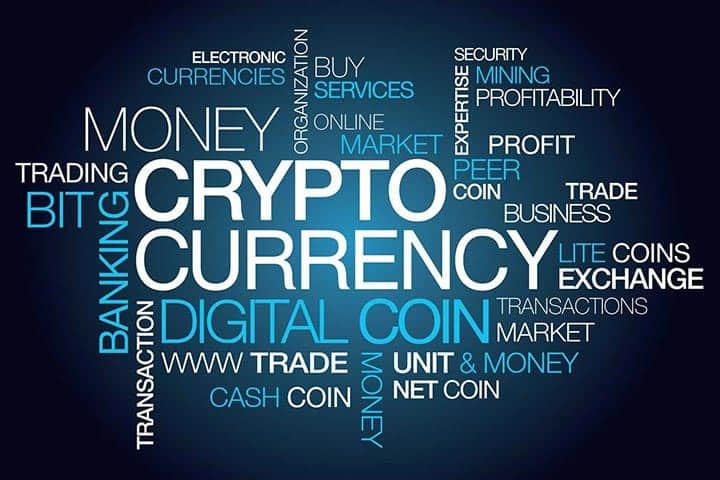The technology behind cryptocurrencies is brand new to a mass audience and it is very common to bounce from fascination to confusion while learning its intriguing crypto terminology. We have collected most of these terms you need, firstly to understand what you’re dealing with and secondly to help you thrive in the world of coins.
We have tried to put them in a relevant order but it is more than clear that you could find any of these words/phrases within the same sentence while reading a post from experts in the field. Let’s do this:
1. Cryptocurrency or Crypto
When you see the word root “crypto” in the English language, it comes from the Greek, meaning “hidden” or “private.” From it, we get words like “encryption” and “decryption,” which relate respectively to the coding of a message and its decoding once it’s received. Even the English word “crypt”—which uses the Greek root in its purest form—refers to a private hiding place, a sanctuary for the remains of a loved one. Cryptocurrency, then, means money that is hidden and private—and therefore secure—by means of encryption or coding.
Keep reading so it’s not all Greek to you any more.
2. Blockchain
A blockchain is a huge file of information containing the complete history of every transaction of a coin ever made. The biggest cryptocurrencies have their own blockchain, such as Bitcoin, Ethereum and Dash, and some piggyback on the blockchain of another, such as Golem, which exists as a token on the Ethereum blockchain.
3. Block
A block is basically a batch of transactions that is processed and recorded forever on the blockchain.
4. Digital wallet
You store physical money in your physical wallet, but you store digital money in your digital wallet -software or hardware- either installed on your computer or on a secure server, which allows you to interact with digital coins and store them at a digital address.
5. Digital Wallet Address or Public Key
A sequence of letters and/or numbers, usually between 27 and 34 characters. Every address is unique. Here’s an example of a Bitcoin address: 1MvSr33cJZhnLxbLc4o8fVsF6viFWfssJS. Every coin that exists on a blockchain is assigned to a wallet address. This way it is easy to see who (you see an address like the above, not a name) owns what.
6. Private Key
Every digital address has a unique private key that has the power to open its corresponding wallet without the need of a password. So, when you set up your own digital wallet and are given your own private key, you should make a point of storing it safely and never ever sharing it with anyone.
7. Hardware wallet
A physical device devoted to keeping coins safe- by keeping your digital wallet’s private key stored and encrypted. Without access to the hardware wallet, which is itself protected by a password, nobody can gain access to your digital wallet except yourself. I highly recommend getting one yourself if you have any amount of crypto you’d be upset to lose. Well, nobody wants to lose anything so why don’t you grab the popular Ledger Nano S?
8. AltCoin
To some people everything but Bitcoin is an alt coin. To some people everything but Bitcoin and Litecoin is an alt coin. To some people everything but Bitcoin and Ethereum is an alt coin. So, what makes a coin an alt coin is based on the opinion of whomever you ask. Though remember Bitcoin did come first, so it should never be considered as an alt coin.
9. Fiat Currency
Fiat currency is defined as legal tender whose value is backed by the government that issued it. So think euros, dollars, pounds etc. Crypto has no central bank so it’s not a fiat currency. Exchanges where you can deposit Fiat is what you need when you deposit from a bank account.
10. Digital currencies exchange
This is a web platform that facilitates the conversion of one coin to another (for example Ethereum to Ripple) based on the current exchange rate. Some platforms allow you to buy crypto using fiat currency, for example Kraken, while others specialize in converting digital coin to digital coin, for example Changelly.
11. Bear/Bearish
Term used to denote that the market is going down.
12. Bull/Bullish
Term used to denote that the market is heading up.
13. ICO (Initial Coin Offering)
An initial coin offering is a means of crowdfunding using cryptocurrency, where a startup company will release a digital currency for investors to purchase. While 9/10 ICOs fail, it is quite hard to determine the ‘next big thing’.
14. Whitepaper
This is the technical write up that most cryptocurrencies provide to take a deep look into their structure and plans. In business world this would be the business plan.
15. Decentralized
In the case of cryptocurrencies it is a copy of the blockchain or digital ledger on every device connected to the specific network. An exact copy of the information is everywhere -therefore decentralized- instead of being stored in a central location like a government or in companyies’ servers.
15. Distributed Ledger
The basis for decentralization, a distributed ledger is a list of transactions that is cloned on every computer and software that is connected to the network. This ledger is updated in every location, all at once, each time a transaction is made.
16. Token
A token is similar to and based on cryptocurrency, but it’s main function isn’t necessarily just transfer of value. Ethereum tokens are a great example of this and extremely popular. ERC-20 tokens are created on top of the Ethereum network.
17. Dapp
Shorthand for a Decentralized Application, a Dapp is a piece of software with a standard UI (user interface) but utilizing a decentralized back-end, meaning it doesn’t run on your computer, instead typically making use of a blockchain and smart contracts.
18. Smart Contract
Smart contracts help people exchange money, property, shares- or anything of value- in a transparent way. Both parties can see the code of the contract, as well as the outcome. Smart contracts also avoid the services of a middleman. For example, when sending money to a friend, a bank is the middleman, taking their cut in every step of the way.
19. HODL
Hold On for Dear Life is an acrynoym, but it really started as kind of an accident. According to crypto legend it was a misspelling on a forum thread. Basically the practice of holding on to your coins and not selling.
20. FOMO
Fear Of Missing Out (or Fear Of Missed Opportunity). People tend to see prices drop or rise quickly or a hot coin or ICO on the market and they don’t want to miss out on the opportunity. Resisting the FOMO can be hard, but you must have self-control to succeed.
21. FUD
Fear, Uncertainty, Doubt. This describes a general disinformation strategy to cause fear among consumers or competition. Emotions tend to drive the market more than anything, don’t give in to the FUD side.
22. Pump & Dump
This is a method of hyping up a coin by buying and holding and getting others to do the same, only to then “dump” it or sell it off at the highest price.
23. Whale
An investor that controls a large portion or amount of a specific cryptocurrency is called a whale. This gives them an advantage similar to having the most chips in a poker game, so you can just lean on the market to make waves.
24. Open Source
Software that has its original source code freely available for download so it can be audited, modified and redistricted by anyone. It is a common way of distributing software in mass to make it increase its popularity.
25. Mining
This is the process of using computer power to process transactions on a blockchain. Miners are rewarded with newly created cryptocurrency for each block they process.
26. Hard Fork
This is when the code or software that comprises a coin like Bitcoin changes in some significant way, typically for improvements. For example Bitcoin Cash was/is a hard fork from Bitcoin.
27. Satoshi Nakamoto
The pseudonym for the mysterious creator of Bitcoin. No one really knows who created Bitcoin and while there is some speculation and documentaries dealing with it out there, nothing is certain.
28. Satoshi
Bitcoins can be bought and sold in tiny amounts. A Satoshi is the smallest sub-unit of a Bitcoin currently available (0.00000001 BTC).
[allcurrencies]









